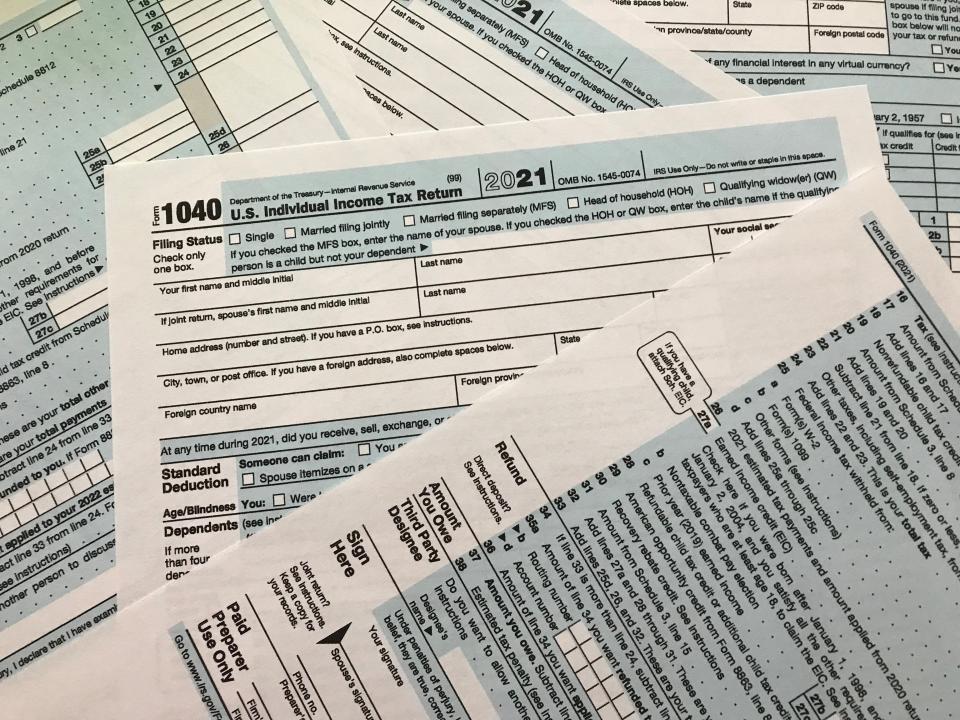Tax refunds delayed by 6 months or more for some paper filers: Here's why
Already millions of taxpayers have been waiting four or five months for their federal income tax refunds after completing 1040 paper returns and putting those returns in the mail in late January or February.
No money is in sight in late June — and, frankly, the wait will take longer.
The Internal Revenue Service has essentially been unable to process the paper 1040 returns that individuals filed in 2022 until it's finished processing the pileup of paperwork filed in 2021.
It's a first in, first out process for paper returns. And if the IRS isn't done with processing paper 1040 returns filed by individuals in 2021, it can't move on to paper returns filed so this year.
This week, the IRS said, the agency will hit a milestone of sorts and be done processing all of the originally filed Form 1040 paper returns without errors that it received in 2021.
As of June 10, the IRS had processed more than 4.5 million out of a total of more than 4.7 million individual paper tax returns received in 2021.
It's an important step that will enable the IRS to move on to work on the 1040 individual paper returns filed in 2022.
You can't get a refund, after all, if the IRS doesn't process the return. Unfortunately, many taxpayers have absolutely no idea that the IRS is buried in this much paperwork. They're just stumped as to why they don't have their money.
New report critical of IRS progress
The accumulation of paper returns has been a troublesome development since the COVID-19 pandemic shutdowns shook up the system. While some progress has been made, it's not enough to get the job done.
Fortunately for most taxpayers, e-filed returns have generated refunds quickly. About 137 million returns filed in 2022 were filed electronically.
About 8 million federal returns filed by paper were mailed to the IRS so far this year. More will arrive as some taxpayers who requested extensions also will file by paper. The IRS maintains that it’s critical for those who still need to file a tax return this year to file electronically, if possible.
By year end, the IRS projects that it can start the next tax season in 2023 without a paperwork backlog.
“The IRS has said it is aiming to crush the backlogged inventory this year, and I hope it succeeds,” wrote National Taxpayer Advocate Erin M. Collins in midyear report to Congress, which was released Wednesday.
“Unfortunately, at this point the backlog is still crushing the IRS, its employees, and most importantly, taxpayers,” Collins said.

The IRS had a backlog of 21.3 million unprocessed paper tax returns by the end of May, an increase of 1.3 million over the same time last year, according to the report issued Wednesday by the National Taxpayer Advocate. That backlog includes amended paper returns.
Collins noted that processing delays are creating "unprecedented financial difficulties for millions of taxpayers and outright hardships for many.”
During 2021, the report noted that the IRS received about 17 million paper individual income tax returns and about 21 million paper business tax returns.
Among business taxpayers, Collins noted, many have been waiting extended periods to receive the Employee Tax Retention Credits that they're eligible to get, in addition to their regular refunds.
The report says the IRS has failed to make progress in eliminating its paper backlog because “its pace of processing paper tax returns has not kept up with new receipts.”
The IRS does not use scanning technology for processing all that paperwork. Instead, six to eight IRS employees can work on a return at various steps in the process, including transcribing the paper return into the system.
"In the year 2022," Collins wrote "it is unacceptable that the agency is still paying thousands of employees to keystroke the data from millions of tax returns, digit by digit, into IRS systems — creating the current processing backlog and producing an error rate in transcribing individual returns last year of 22%."
How long should it take?
On Wednesday, after the release of the National Taxpayer Advocate report, the IRS took issue with the backlog inventory numbers in report, stating that the numbers are "neither the most accurate nor most recent figures."
"Newer numbers through June 10 demonstrate that the IRS is ahead of tax return processing compared to a year ago," the IRS said, stating that the agency continues to make substantial progress.
The IRS said 19.13 million paper returns — amended and original returns — awaited processing as of June 10. That's down slightly from 19.88 million paper returns in the pipeline at the same time a year ago.
Of the total, however, IRS numbers indicated that 11.2 million individual paper returns awaited processing as of June 10, up from 9.6 million similar returns at the same time last year.
The tax deadline was extended until May 17 during the 2021 season; and April 18 last year.
Efforts have been helped, the IRS said, by hiring more workers, adding new contractor support, shifting existing staff, providing mandatory employee overtime and developing efficiency improvements.
Only one number matters to taxpayers, of course, and it is the one that shows up in their bank account for their tax refund. And tax refunds are not arriving quick enough for many who filed paper returns.
In general, the IRS issues refunds within a few weeks to a month. Paper returns take longer than electronically filed returns, even if there are no mistakes or issues.
Before the pandemic, someone who filed a return by paper might wait four to six weeks for a refund.
Many taxpayers who filed paper returns in 2021 got caught in the backlog and reported waiting six months and longer to receive their refunds.
The IRS acknowledged Tuesday: "To date, more than twice as many returns await processing compared to a typical year at this point in the calendar year."
Worries build among families and friends who filed paper returns
The anxiety has been huge the last few months for those who filed paper returns in 2022.
JoAnn Marino, of Washington Township, began worrying when a few family members called her saying they did not get their federal income tax refunds yet — they're OK with the State of Michigan — when she filed paper returns for them back in early April.

A nephew is getting married in November and fears that he won't get an estimated refund of around $3,600 in time to cover some of those big wedding bills.
His sister is expecting a tax refund of around $1,000 and could use the extra cash now to cover some down payments for a wedding next year.
Marino prepared about a dozen tax returns at no charge for various family members this year. For free? Why? "Cause I'm a nice person," she joked with me by phone.
She retired during the pandemic from her job in financial services and figures she can take up to 12 hours or so early in the year to prepare tax returns for her family, including her mother. Most of them have pretty basic returns; she uses a CPA for her own return.
"They're young, single," she said of some family members. "My nephew doesn't even own a home."
Marino, 62, used TurboTax, buying the software for around $50 at Costco. But the software puts a limit on how many e-filed returns can be done via that software program. She doesn't want to go out and buy more software, she said, so she files the remaining returns by paper.
"We've always filed some of them by paper and it's never been an issue," she said. "All of the e-filed returns have been processed."
Marino has absolutely no clue what's happened with her family's paper returns. She's tried to get information online at "Where's My Refund?" at IRS.gov. But nothing shows up there.
The IRS doesn't post information for paper returns at "Where's My Refund?" until those returns are processed. "Where’s My Refund?" does not explain any status delays, reasons for delays, where returns stand in the processing pipeline, or what action taxpayers need to take, according to the National Taxpayer Advocate's report.
Marino even called a local H&R Block office to see if they could give her some tips on what she should do. She asked if she should amend those returns. She was told that she absolutely should not do that. The IRS doesn't want people just filing an amended return if they're dealing with a delay related to the filing of a paper return.
More: Average tax refunds higher than last year but paper headaches remain
More: Taxpayers waiting for refunds find little help from IRS's 'Where's My Refund' tool

An Eastpointe man who has emailed me regularly about his refund delays still has not seen any cash. It's now been 19 weeks since he sent in his return. The reader, who asked not to be named because he did not want others to know about his finances, is expecting $2,997 for his federal refund. He received his state of Michigan refund in mid-March.
The IRS is paying interest on delayed refunds. From April 1 through June 30, the agency is using a 4% interest rate for individuals who face refund delays. But the rate is set to go up to 5% on July 1. Often, taxpayers can see a blended rate.
Taxpayers faced different challenges
Many people did not face delays. More than 85% of individual taxpayers e-filed their federal income tax returns, according to the new report, and they either received the refunds they claimed or paid what they owed without any problems.
By late May, the IRS reported it had received about 145 million individual income tax returns and issued 96 million refunds to those filers. About 66% filing received refunds.
Even so, the tax season wasn't a walk in the park for many. On April 18, the Taxpayer Advocate noted, a significant spike in IRS web traffic caused a temporary disruption in taxpayers’ ability to access the "Make a Payment" feature in the Online Account.
"While the IRS resolved the issue the same day, it affected 891,000 individuals and added a level of anxiety for those taxpayers on an already stressful day," Collins wrote.
In addition, Collins wrote, millions of e-filed returns were suspended during processing due to discrepancies between amounts claimed on the returns for the recovery rebate credit and amounts reflected in the IRS’s records.
On June 3, the report noted, the IRS updated its website to inform taxpayers that due to extenuating circumstances caused by the pandemic, its identity theft inventories have increased. On average, it is taking about 360 days to resolve identity theft cases.
The most serious hardships, one might argue, are being created by those extraordinarily long delays for receiving a tax refund.
Typically, the IRS doesn't start a tax season with such sizable paperwork hangover.
"Over the last two years, IRS inventories snowballed into unprecedented delays and challenges, and the IRS is still struggling to catch up," Collins wrote.
And the onslaught continues. While the official tax season deadline was April 18, an estimated 18 million taxpayers filed for extensions, which are due Oct. 15. It's a larger than usual level of extensions, according to tax experts, and more paper returns for 2022 will add to the workload ahead.
The IRS noted Tuesday that the agency continues to receive current and prior-year individual returns and related correspondence as people file extensions, amended returns and a variety of business tax returns.
Behind every piece of paper is a real person who is anxious — and possibly even under financial stress — when their tax refund money faces one delay after another.
Contact Susan Tompor via stompor@freepress.com. Follow her on Twitter @tompor. To subscribe, please go to freep.com/specialoffer. Read more on business and sign up for our business newsletter.
This article originally appeared on Detroit Free Press: IRS again faces backlog, bringing refund delays for paper filers
